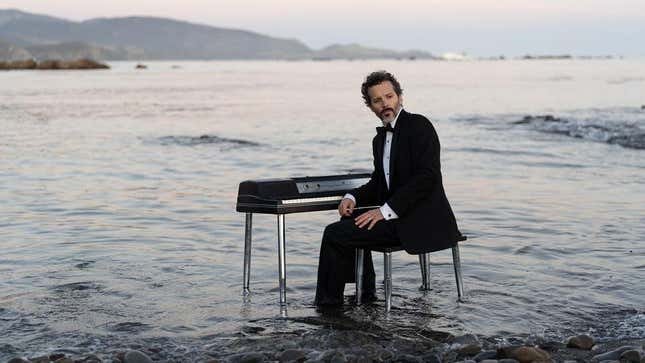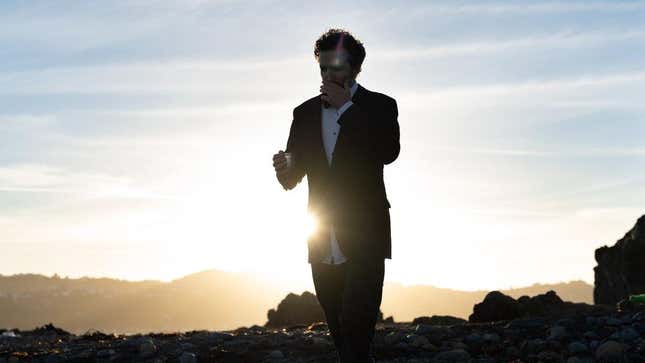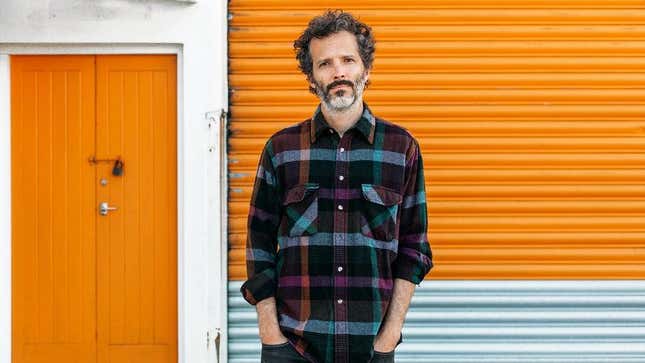
Bret McKenzie is a funny guy. Whether performing as half of Flight Of The Conchords, which he and musical partner Jemaine Clement jokingly billed as “New Zealand’s fourth most popular guitar-based digi-bongo acapella-rap-funk-comedy folk duo,” or composing Academy Award-winning songs for movies like The Muppets, McKenzie has made a career out of writing music that’s funny. But his debut solo album Songs Without Jokes, which was released through Sub Pop last week, is serious business.
Written mostly at McKenzie’s home in Wellington over the past few years and then recorded with a team of legendary session musicians in Los Angeles, Songs Without Jokes is decidedly not a comedy album. Instead, it finds the 46-year-old Kiwi reflecting on how messed up the world is in lushly orchestrated, deceptively fun songs modeled after the late-1970s singer-songwriter studio-pop of artists like Harry Nilsson and Randy Newman, with a dash of the “full ’80s synth driving music mode” of Dire Straits thrown in.
That doesn’t mean that Songs Without Jokes isn’t funny. Like his musical idols, McKenzie excels at tackling heavy subjects with a light touch, crafting serious songs with an unmistakable wry humor. Fortunately, that same sense of humor was on full display when he sat down with The A.V. Club to discuss the new album, his tour in support of the release, and the never-ending list of projects he’s working on.
The A.V. Club: First of all, congrats on the album release. How does it feel now that Songs Without Jokes is out in the world for everyone to hear?
Bret McKenzie: It feels awesome. Because I started it about 2018, the first recording session was in 2019. I thought it was going to take me about six months. I was saying to people, ‘Yeah, I’ve got the tracks, I’m gonna have it done in about three months, we’ll mix it, it’ll be out.” Anyway, it’s taken three and a half years or something.
It’s super exciting because it’s been in my head and at my house for a long time and it’s just really cool now, people actually hearing it and connecting with it in their own ways. Because you don’t know which songs are going to resonate with people. It’s funny, because my kids, for ages, I’d play a song on the piano and they’d say “Why isn’t it on Spotify?” So it’s just great that they’re now on Spotify so my kids think it’s real.
AVC: What was the first song you wrote for the record?
BM: “That’s L.A.” was the first song. It started with just that idea. Mickey Petralia is the producer, and we’re always working on songs for films. One time we thought it’d be funny to do some music that wasn’t for films. He has a studio in Pasadena, in Los Angeles, and I played him the idea of “That’s L.A.” We got a drum machine and a synth part. It started to have a bit of a Steely Dan feel. We got really excited. That was the kernel of, “Oh, we could do a whole record!”
AVC: Is there a difference in the writing process between writing comedy songs, or songs for movies, and writing these songs that are just songs for their own sake?
BM: Normally, for my job, I get asked to write for these situations, for these stories, for films. And I get sent an email, and they describe what they want in the song. I have these really clear parameters of what the song needs to be. So what I was interested in was not having any restrictions or not having to tell a story. Even just as simple as repeating a chorus. You don’t get to do that much in songs in film or TV. So it was a real pleasure to say, “Yeah, do a double chorus! Triple chorus! Fade out on the third chorus!” [Laughs]

AVC: So was it liberating to not have to worry about all that?
BM: Massively liberating. So fun for me. At the same time, a little bit scary. I remember going to the studio and playing the songs, and I was so used to just playing songs that are protected by jokes. And to play a song that wasn’t written to make people laugh, it was to capture a feeling—and a personal feeling—was quite vulnerable. But all the musicians were positive and I got more comfortable in it.
AVC: Did you ever have to stop yourself from putting jokes in? Like, “No, I’m not allowed to be funny!”
BM: I was quite obsessive about it not being funny. It’s a little bit like a comedy actor getting a dramatic role and just taking it a bit too seriously. The first time they do it they’re like, “Oh, I’ve gotta be really serious.” And then I think actors realize comedy actors can do drama. You don’t have to try that hard to be dramatic. I was quite obsessive because the project was to do songs that are not a comedy project. Since then, I’ve been writing more songs, and I’ve lightened up a little bit. I’m not as obsessive. It’s fine. You can have jokes in songs that are still serious songs. A lot of my heroes, songwriters who do have very funny songs like Leonard Cohen, Harry Nilsson, and Randy Newman—I like that music, and I like songs that have little stories and characters and funny little moments in them, it’s just they’re not written for a comedy club.
AVC: Speaking of Harry Nilsson and Randy Newman, the album sounds very inspired by that 1970s Los Angeles studio-pop era. With Flight Of The Conchords and, say, that fake Morrissey song you wrote for The Simpsons, you’ve written so many songs that sound like so many different things. What drew you to this sound in particular for this project?
BM: Part of it was the session musicians. The beginning of the idea for the record was to make it with L.A. session musicians, because I’d met them working on the film soundtracks. Really amazing players. We were recording in the studios where ’70s and ’80s music was recorded in, and those players played on those records. So it felt like we were aiming for this real studio session sound that is that kind of late-’70s L.A. sound. It started off sounding ’70s, and we tried to make it sound more contemporary and got as far as the ’80s. But I think there’s something in that sound world that I just really love.
Working in the studio, you’re looking for sounds and then you find one that feels cool or feels right, and we just sort of followed that path. It’s funny, sometimes we’d be working, and I’d be like, “Oh no, it’s too much like Dire Straits.” Because I was so used to doing parodies of genres and really accurate replicas. This was different in the same way with the songwriting. I was taking sounds from some of my favorite artists and absorbing them and trying to turn them into something of my own. I think “If You Wanna Go” is a good example of that. It’s sort of Elton John-y, but it’s also a little bit Starbuck, and then it’s also … who knows? We were like, “Oh well, it’s just taken off on its own, just go with it.”
AVC: What was it like getting to record your own music with all of these legendary session musicians?
BM: It was so beautiful. I had worked with them on the film songs. And that is probably my favorite thing that I get to do in my job working in Hollywood. They’re such incredible players that you go in there with a song and then they lift it up and make your song better. But what was incredible was working not on songs for films but on my own songs. I’d come up with the idea, and then they’d just lift it up and suggest things. Dean Parks would say, “Sometimes on the Steely Dan tracks we’d put an acoustic rhythm track just to kind of glue it together.” I’d say, “Oh, well, that sounds good, let’s do that!” Just beautiful, beautiful ideas. Lee Sklar, amazing bass player, sometimes he’d start a tune and everybody would be like, “What’s that sound?” and he’s put a chorus pedal on his bass. Just the sort of playing that you get from playing stadiums with Phil Collins. He knows how to get this pillowy bass sound. Tricks from decades of playing in studios. There’s nothing like that. So it feels a bit like I was an apprentice in a music studio. And learning from that. It was really magic.

AVC: I wouldn’t say the album is depressing, but it touches on a lot of heavy stuff—the pandemic, climate change…
BM: It is a bit depressing. I’m about to go on tour. I put together this band in New Zealand of amazing Wellington players, and we’re getting ready to go out. And as soon as I started rehearsing, I thought, “Oh.” Half of the album is kind of heavier, on the slow side. And even some of the uptempo tracks, like “This World” is a pretty depressing song even though it’s wrapped up in a very jaunty, catchy melody.
AVC: I like that the album has these dark moments but it makes them sound fun. It feels like not necessarily a joke but sort of a musical punchline, in a way.
BM: Yeah, that contrast. I do love that layering. Even in Conchords, I remember sometimes we’d do a scene, and if it had something serious going on, or not serious, but some story thing in the foreground, sometimes we’d put something really silly in the background. And I love that in Morrissey. The Smiths’ songs do that really well. Tragic songs but you want to dance to them.
I would write a lot of these songs in the evenings. I’d foolishly read the news in the evenings, which now they advise you not to do. [Laughs] I’d be playing my guitar and just absorbing that feeling of what was going on in the world. And the feelings of the future of the world. There’s something about having kids, something about where things are at. I mean, I wrote “This World Is Broken” four years ago. It’s like with COVID, the world was cracking at the time when I started writing this, and then it just fell apart. [Laughs]
AVC: You wrote most of the album before COVID, but some of it you wrote during the pandemic?
BM: I wrote most of it just before COVID and then “Crazy Times” and “If You Wanna Go” are the two songs that I wrote during COVID, and we recorded them by Zoom. That was quite something. That was the first session, that was when people were just getting back in the studios.
AVC: And now you’re going on tour! Which would’ve seemed totally impossible a couple of years ago.
BM: Yeah, completely. Even now it seems complicated. But people are touring, so I’m gonna give it a go and take a big band. We’re doing New Zealand and then coming to the States in October. I can’t wait. I’ve been on Zooms and emails for months and years now. I haven’t done a gig in four years. But it doesn’t feel like four years ago. I want the show to be really fun live, so I’ve written a few new songs that have a bit more energy. I’m working out what the live show is. Because that’s also a different experience for me. The audience is expecting comedy from me, so I’m just figuring out how to navigate the audience and what the show’s gonna be. It’s quite a crazy thing.
AVC: So you’re going to debut more new songs on tour?
BM: Yeah. So these are all new, and I’m going to play some new new songs. And I’ll play a few old ones so the audience can relax every so often, like, “Okay, we know this one.” But yeah, I’ve got new ones. I’ve started recording the next album. Mickey and I started that this year. So we’ll see how we go.
AVC: Do you have any sense of what that’s going to be like or is it still taking shape?
BM: It’s more ’70s. It’s actually got a little bit of a James Taylor-y vibe. You know that song “One Man Parade,” One Man Dog, that album? I wanted to take away the synths and get a bit more organic sound. But in a year’s time I might tell you, “Yeah, we put the synths on, they sound too good.” One thing that’s been quite fun is I’ve started rehearsing with the band. I’m starting to write songs with a band rather than myself in a room, and a bit more energy happens.
AVC: Do you have any other projects coming up or anything that you’re working on?
BM: Yesterday I did a session with The Simpsons. I’ve done another song with The Simpsons. Always a highlight, man. On the Zoom with Homer. I mean … it’s just too good. That’s such a fun Zoom. Working on a few songs for films. There’s a fantasy film Jared Hess is doing called Thelma The Unicorn, an adaptation of a kids’ book. And then a musical, a George Saunders adaptation called The Brief And Frightening Reign Of Phil. Crazy sort of political, surreal book. I’m working with a writer in the UK called Tim Price and a director in the UK called Lyndsey Turner. Really dark political comedy about a president who doesn’t know what he’s doing. That’s really fun, kind of different. Lots of films.
AVC: Is it nice to get back to writing for other projects after doing all of this writing for yourself where you have to dig deep into your emotions?
BM: Oh yeah. The unicorn’s upset? No worries man, I got this. [Laughs] It is fun. What’s interesting is it’s not like they’re two completely different worlds. What’s been fun is by writing these songs for myself I’ve cracked another part of the songwriting puzzle, and I can use those skills for the films. Early on when I was writing for film I found it hard to write anything that didn’t have a joke in it. I felt really out of place.
And then working on the Muppets stuff I sort of started to see how that worked. I did this incredible concert with the Muppets in Wellington, with an orchestra, and it was crazy. I sang “Rainbow Connection” with Kermit onstage, and it was so cool, but people in the crowd are just crying. Grown men are weeping at the nostalgia of the Muppets. I was like, “Whoa.” I spent my whole life making people laugh. This is a whole different thing. Just sort of beginning to learn how a song can be powerful in different ways. And often in films, even though they maybe want something funny, they also want the character to sing their feelings. So it all connects up.